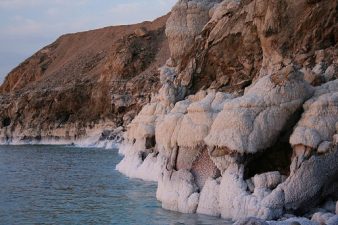 Digging for freshwater, Wadi Holdings found salt water instead; two years later, and their Seabass farm in the desert is roaring
Digging for freshwater, Wadi Holdings found salt water instead; two years later, and their Seabass farm in the desert is roaring
Anyone with an untrained eye entering a desert environment would see a vast expanse of virtual nothingness: only the occasional sandstorm or a stray herd of camels sauntering by might break the blank horizon, but few would expect to find whale fossils left behind when the Tethys Sea slunk away. Fewer still would think to bring their fishing rods.
Saltwater desert
Even Wadi Holdings, a Lebanese agri-business firm, were surprised. Drilling for underground freshwater in order to develop an olive plantation, they instead discovered vast reserves of saltwater 120 kilometers south of the Mediterranean coast in Behiera governorate.
The water’s salinity is measured at 26ppt, compared to the Mediterranean Sea, which measures 36ppt, according to Christopher Le Coq writing for The Daily News Egypt.
Initially the firm was perplexed, certain that this water was not ideal for growing crops, and sought counsel from an Aquaculture Consultant office in Cairo. Their disappointment was short-lived.
A gift from God
The consultancy office told Wadi Holdings that the discovery was a “miracle and a gift from God,” and proceeded, with aquaculturalist Mahmoud Shokry Asfoor at the helm, to initiate the Wadi Natroun fish farm on the firm’s behalf. Two years later, according to the reports, they have been wildly succesful.
After experimenting with various species, including tilapia, shrimp, and seabream, the farm pushed forward with Seabass, which responded well to their home in the desert. Because water temperatures are consistently warm at 19-27° Celsius, the fish eat more and grow more rapidly than they do in cooler waters such as those in Southern Europe.
While the first fish was sold in Egypt two months ago, writes Le Coq, Wadi Holdings expects to increase its supply from 12 tons of Seabass in the first season to 40 tons by the third. And since the fish fetch precious little on the local market, they have set their sights on Europe, where they can earn up to nearly $18 per kilo.
Egyptian Seabass bound for Europe
Currently, Egypt is not permitted to export to farmed-fish to Europe, but officials from the European Union have investigated the quality of Wadi Natroun’s fish, and negotiations are now underway.
Seabass farming has been so succesful that both Wadi Holdings and the International Finance Corporation (IFC) intend to contribute a further $750,000 each to expansion. A part of that plan will include transporting some fish to Wadi Rayon Lake in Fayoum, where the fish will go through the final stages of growth before market.
Egypt is currently the fourth largest producer of Seabass in the world.
:: image via snowpea&bokchoi and story via Daily News Egypt
More news from Egypt:


